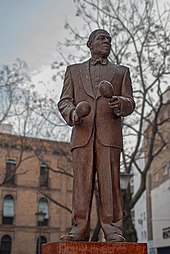Antonio Machín
Antonio Abad Lugo Machín (born February 8, 1908 in Sagua la Grande , † August 4, 1977 in Madrid ) was a Cuban bolero singer . His title El Manisero was the first Cuban record to sell more than a million copies.
Machín began his musical career as a solo singer in the Casino Nacional de Havana and was the first colored Cuban singer in this position. With the Orchestra of the Casino Nacional he traveled to New York in 1930 and sang El Manisero ( The Peanut Vendor ), the first Cuban song to become a hit in the USA. In the period up to 1935 Machín recorded more than 200 records in New York. He preferred small ensembles with claves , tres , guitar and trumpet for his recordings and often sang duets with the guitarist Daniel Sánchez . Mario Bauzá , who later became the musical director of Machito's orchestra, also became known from this quartet line-up .
Machín left New York in 1935. He first went to London and Paris and lived and worked from the Second World War in Spain, where he worked. In addition to El Manisero , songs like Angelitos Negros , Dos Gardenias , Corazón Loco and Envidia are among his great successes. Since 1981, recalls in Barcelona a monument on the Plaza de Vincenc Martorell from the workshop Subías Berlinghieri at Machín. In Seville , in the Plaza de Carmen Benítez, there is another statue of him, which Guillermo Plaza created.
Web links
- Antonio Machín on MusicBrainz (English)
- Antonio Machín at Allmusic (English)
- Antonio Machín at Discogs (English)
- Antonio Machín in the Internet Movie Database (English)
Individual evidence
- ^ Ned Sublette Cuba and its music: from the first drums to the mambo. Chicago 2004, p. 399
- ↑ Torge Braemer: Barcelona: and their guitarists , Books on Demand, Norderstedt 2016, ISBN 978-3-7392-7286-3 , p. 151 (2nd edition)
- ↑ José María de Mena Historia de Sevilla Seville 2011
| personal data | |
|---|---|
| SURNAME | Machin, Antonio |
| ALTERNATIVE NAMES | Lugo Machín, Antonio Abad |
| BRIEF DESCRIPTION | Cuban singer |
| DATE OF BIRTH | February 8, 1908 |
| PLACE OF BIRTH | Sagua la Grande |
| DATE OF DEATH | 4th August 1977 |
| Place of death | Madrid |
